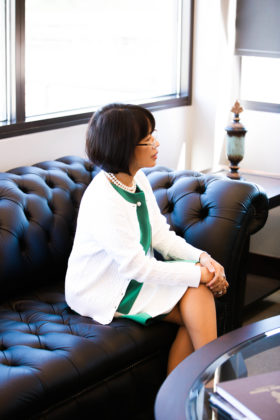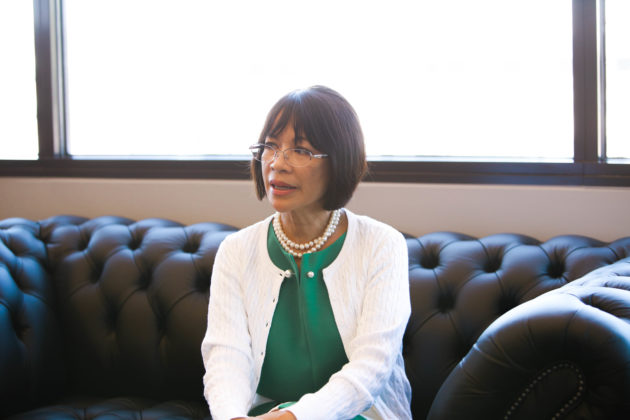Astrid S. Tuminez coined a phrase while speaking to maids in Singapore: “Dreams are free.”
She said there are thousands of women, many of them from her native country of the Philippines, who have left their homes and their children to work as maids. Some of them have very difficult lives working around the clock, not being paid well and not being treated well.
Then her “favorite saying” came to mind.
“I wanted them not to define themselves as maids,” she said. “I wanted them to define themselves as people who … are setting aside money for their dreams, and so I said, ‘Dreams are free.’ Nobody has to give you permission.”
Tuminez knows what she’s talking about. Born in poverty, she rose above her circumstances to attend BYU, Harvard and MIT; become fluent in five languages including Russian, French and Ilonggo; and work around the world in five different countries for organizations such as the Carnegie Corporation of New York, the United States Institute of Peace and Microsoft.
Most recently, however, her career has taken her to Orem, where she became the seventh — and first female — president of Utah Valley University on Sept. 17. A 24-member presidential search committee consisting of members of the Utah State Board of Regents, the UVU Board of Trustees, UVU faculty and staff, and community and alumni representatives chose Tuminez from a pool of 41 national and international applicants, according to a UVU news release.
“My dreams are, that (in) coming here and particularly being president of UVU, that I am able to inspire and motivate and lead by example,” she said. “And that I am able to continue to strengthen our mission of inclusion and diversity and (be) able to say that there is potential in every person who is here.”
‘A childhood of great hope’
Tuminez’s life began in a tiny farming village in “the middle of nowhere” in the Philippines, where she was delivered by a half-blind man who acted as the village’s self-appointed midwife.
When she was 18 months old, however, her mother decided her six children’s future would not be in that village, where they would likely become farmers themselves and never learn English. Tuminez’s mother moved their family to the city, which meant living “anywhere we could.”
After her mother helped a local politician win an election, they were given the right to build a hut on the beach in a slum area. Tuminez said she spent the first 14 years of her life in this hut.
She characterized the poverty of her childhood as one where she didn’t know where her next meal was coming from and didn’t have proper clothes, shoes or medical care.
However, “that taught me to be hardy and resilient and learn to solve my problems on my own, even at a very young age,” she said.
Her life changed when she was found by the nuns of the Daughters of Charity and offered a free spot in their school, which was then the second most expensive in the city.
“Education becomes the key that unlocks the door to everything else,” she said.
At school, Tuminez discovered social interaction, things she was good at, and “grappling with language,” such as literature and poetry.
School is also where she learned to dream, reading about New York City and the United Nations in Time Magazine. When a missionary asked her at age 10 what she wanted to be when she grew up, she said, “I’m going to live in New York, and I’m going to work in the United Nations.”
“I had no clue what New York City was,” said Tuminez, who would go on to intern at the United Nations in 1987 and who would live in New York City for 13 years.
Another major influence in her childhood was religion, where she regularly attended Catholic confession and Mass.
She joined The Church of Jesus Christ of Latter-day Saints at age 11, which became “another very critical part of the journey of the belief in divine worth and perfectibility,” she said. “It doesn’t matter where I was born or who I am. I have divine potential.”
And despite crippling poverty, her childhood became “a childhood of great hope” because of education and spirituality.
The BYU years
Tuminez began college in the Philippines, where she studied for a year and a half while waiting for her visa so she could attend BYU. She eventually attended on full scholarship and graduated summa cum laude as valedictorian.
She called her years at BYU “very, very exciting” because it was the first time in her life that she had electricity and running water all the time.
“I thought, ‘How could school possibly be too difficult when you have running water and electricity? What else do you need?'” she said.
She was also overwhelmed by the tall people on campus and surprised that unfavorable traits in the Philippines, such as being small and thin, were often considered good in the United States.
On top of that, “the academic journey was very powerful at BYU,” she said.
Tuminez immediately knew she wanted to study Russian, which she had only dabbled in while in the Philippines. She got a part-time job in the Department of Germanic and Slavic Languages (reorganized as the Department of German and Russian in 2014), where she worked 20 hours a week while taking as many as 18 credit hours.
She also held “a deep concern about why we were willing to destroy the Earth” and considered herself an activist regarding the nuclear arms race, for which she looked to her mentor Gary Browning. This later influenced her to minor in defense and arms control while completing her doctorate in political science at MIT.
At BYU, she double-majored in Russian and international relations and also had “nearly a minor” in French, which she spoke fluently. She lived in the Russian and French language houses all except one or two semesters, taught the first set of Russian speaking missionaries at the MTC and wrote the first manual for teaching Russian.
“These are opportunities that I wouldn’t have had in the Philippines,” she said. “I found BYU to be a very welcoming place, and it was just an amazing luxury all of a sudden to be in this university where everything worked.”
Sometimes, she said, she would get asked on a date, but she would always say, “No, who has time to date?”
A ‘phenomenal’ work ethic
After the “very strong foundation” given to her at BYU, Tuminez went to Harvard on full scholarship where she earned her master’s in Soviet studies and then to MIT where she completed a doctorate in political science.
She worked in a variety of positions in Russia, Singapore and other countries before coming to Microsoft in 2012 as the regional director of corporate, external and legal affairs for Southeast Asia, according to her Curriculum Vitae.
Antony Cook, Microsoft’s associate general counsel for corporate, external and legal affairs for Asia, said he’s been with Microsoft for nearly 17 years. He’s known Tuminez since she was hired at Microsoft and called her work ethic “phenomenal.”
He also said the markets in Southeast Asia are full of challenges, but Tuminez’s strength was getting to the root of a problem and developing strategies to tackle them.
“She was not someone I ever saw who would get particularly flustered or panicky,” Cook said.
In addition, Cook said Tuminez had a “deep engagement” in the Microsoft Philanthropies program, which uses Microsoft to advance digital skills; this will particularly benefit a college community, as Tuminez recognizes the importance of digital skills in education. He also said her involvement in diversity and inclusion issues, particularly women in leadership, will also be beneficial on a college campus.
She’ll be a positive role model for girls and women, he added, not only because of her accomplishments but because of how she carries herself.
He said Microsoft will miss Tuminez’s diversity of experience, her ability to create insights and operate with people, and her strong relationships with both her team members and her business partners.
“There’s probably not another person on the planet that has (her) set of experiences,” Cook said.
Choosing UVU
Tuminez said Microsoft was “a wonderful journey for me,” and she wasn’t looking for a new job — she was looking for the next thing in her life with meaning, which could’ve been at Microsoft, too.
Then her friend Kent Christensen, an art professor at UVU, mentioned the UVU president job. Though Tuminez initially thought the job wasn’t for her, the thought to look into it wouldn’t go away, so she researched the campus’s programs and values.
“The more I learned about the ethos, the more attracted I was,” Tuminez said. “And then I realized, this is really a fearless institution. It is not afraid to innovate. It is not afraid to say to people, ‘We are for traditional and non-traditional students.'”
From there, she navigated the months-long selection process, where she was eventually named as one of four finalists in early April 2018 and was announced as the president of UVU on April 20.
Tuminez said she hopes to bring an expectation of excellence to UVU while reminding both students and faculty that they have potential.
“My ethos is exceptional care and exceptional accountability,” she said.
She also said they want to give options to people of various backgrounds, such as people who are working and perhaps need longer to finish school, or mothers who want to finish their degrees.
“My own view of education is that if we are serious about lifelong learning, it is a kind of learning that we’re actually implementing here,” she said.
Best dreams, best efforts
Tuminez said some of the greatest influences in her life have been her teachers, particularly a sixth-grade teacher from the Philippines with whom she still keeps in touch. She also named her BYU mentors and the sister who raised her and instilled in Tuminez a sense of discipline.
She also named the Catholic nuns who gave her access to education.
“They were the ones who taught me, in their words, to see Christ in every person,” she said.
Tuminez, who is a mother of three, also credits her accomplishments to her husband’s support and said women balancing a career and family “shouldn’t be so controversial.”
She said “a critical pillar” for women is marrying the right person, if they choose to marry. Tuminez said they need to find someone who can help them honor their dreams and with whom they can create a mutually respectful and loving relationship.
She said women have to be forgiving about the stresses in their life because regardless of if they stay home or pursue careers, there will always be tension.
“You choose … the battles you’re going to fight,” she said. “It’s a myth to say ‘I’m having this very nice balance.’ I don’t think that happens if we really want to push ourselves.”
Now in her 50s, Tuminez said she’s happy.
“I don’t feel like I’ve done everything I wanted to do,” she said. “I don’t feel like I’ve succeeded in everything. But I feel that I’ve given my best dreams my best effort.”







